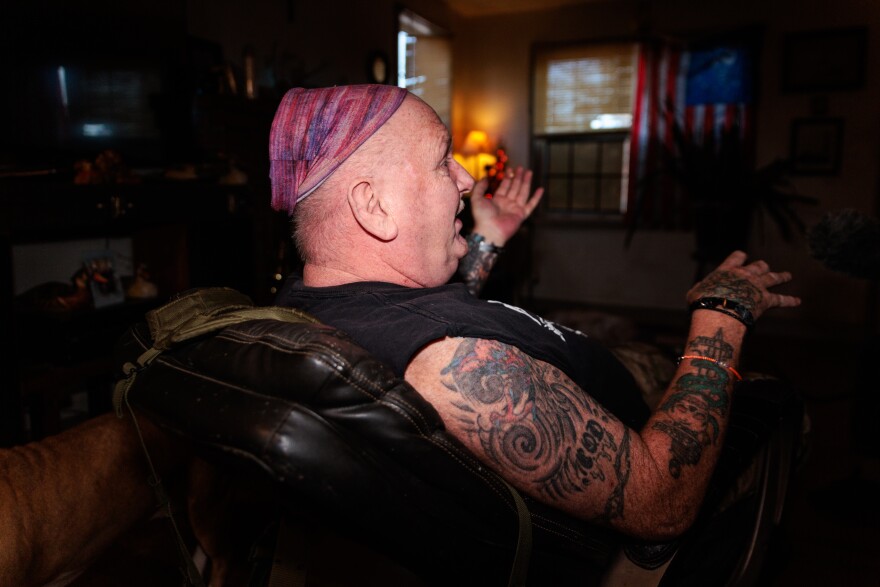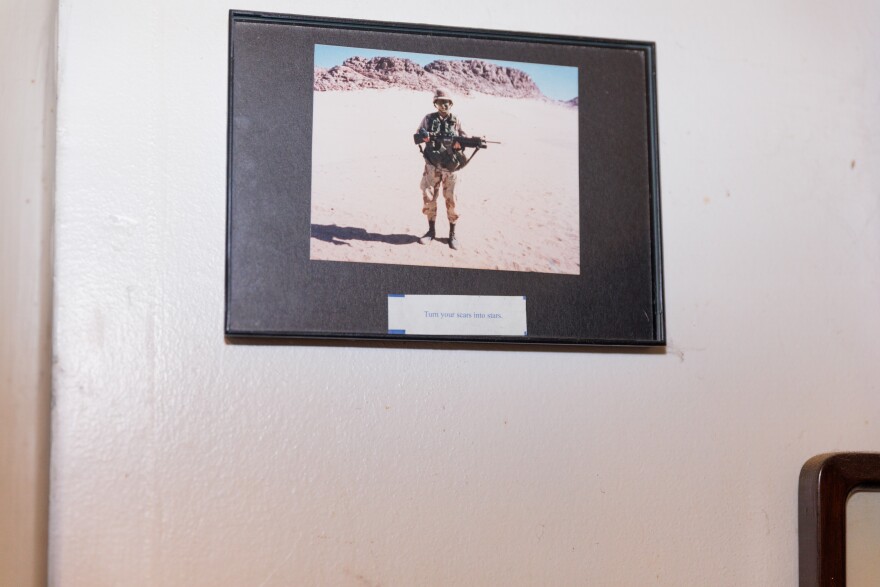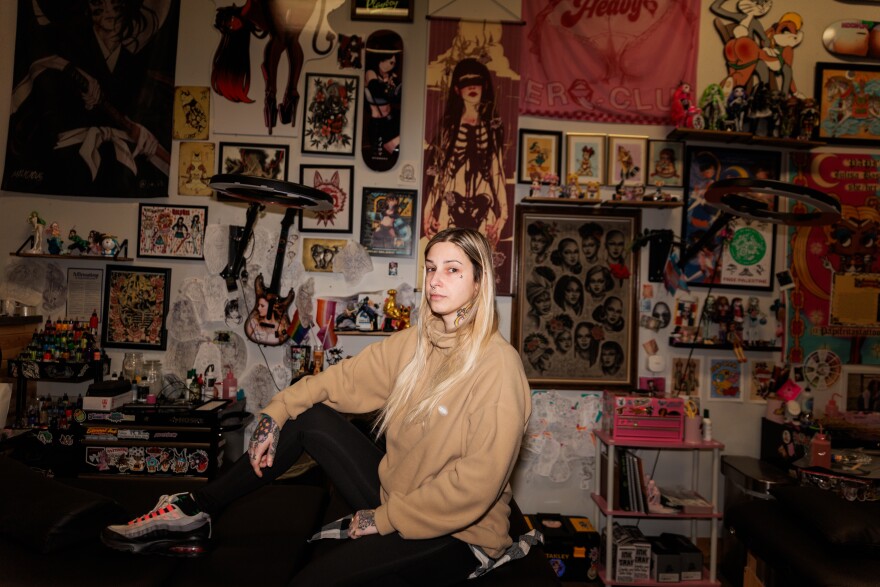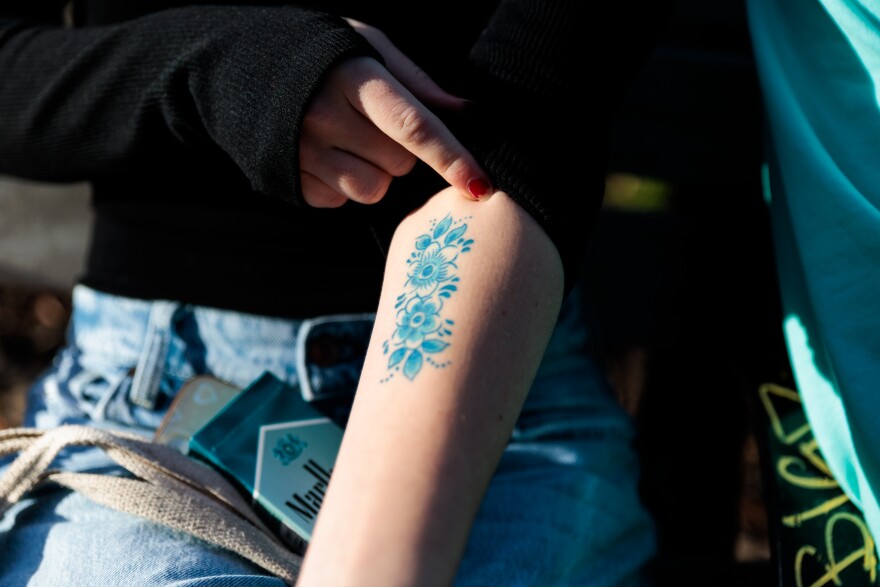Richmond is known for many things: the James River, the Virginia State Capitol, its Confederate history and its modern protests. But it’s also known for tattoos.
Richmond resident David Gorman asked Curious Commonwealth why there so many tattoo parlors in the city.
“I guess Richmond is kind of an artistic city,” he said. “We have VCUArts program and all that; we have a lot of music festivals and stuff. I guess it kind of makes sense that there's a good tattoo scene here but ... I wonder if a tattoo artist has more info on the history, you know?”
What the numbers say
Richmond has occasionally been cited in national publications as being among the top five most tattooed cities per capita — meaning there are more shops per person here than most other places in the country.
But most of those sources don’t cite any data, and national data can be tough to track down on tattoo parlors. However, according to state records, Richmond does boast the zip code with the most tattoo parlors in Virginia: 23220.
That zip stretches from Maymont and Oregon Hill in the south to the Diamond and Virginia Union University in the north. It includes most of The Fan neighborhood and parts of Jackson and Monroe wards. It also encompasses Virginia Commonwealth University’s Monroe Park campus — which is near where some believe Richmond’s tattoo community coalesced.
When it comes to registered tattoo artists, Virginia Beach is king. State data shows seven out of 10 of the top ZIP codes for tattooists are in Hampton Roads, and five are in Virginia Beach.

Soldiers, sailors and art students
Danny Black came to Richmond in the late 1980s, following a job offer from up-and-coming art punks GWAR.
“I could tell they were breaking out. I was like, 'This band is going places,'” Black said, speaking at his McGuire neighborhood home in Southside.
Black had been serving in the Army, where he said tattoos were more common than in civilian populations. He said tattoos were rare then — even in GWAR’s circle.
“Those guys used to make fun of us because we had tattoos. None of them did. Nobody had any tattoos. They would call me ‘a human doodle pad,’” Black said.

At the time, GWAR guitarist Dewey Rowell introduced Black to Crazy Ace Daniels, a Canadian tattooer and biker who owned a shop in on the 800 block of West Broad Street — in the 23220 zip code.
“He was a funny guy, kind of a scary guy. Even for me, you know. Being a paratrooper, I was like, ‘This guy is like a little bit on the edge.’ Big man, size of a doorway and just covered from head to toe in tattoos,” Black said. “He was nice. He seemed like a gentle giant.”
According to Black, Crazy Ace was a catalyst for mainstreaming tattoos in Richmond, working in the city as tattoos gained wider cultural acceptance.
“It was Ace that caused all that. He would bring in really good young apprentices, not bikers or anything. This new breed were all VCU art students,” Black said.
Crazy Ace was good at networking, too. He knew the big names in tattooing — Ed Hardy, Lyle Tuttle, Gill Montie — and would bring them to Richmond to do guest spots. Ace even started a tattoo expo, which continues today as the Richmond Tattoo and Arts Festival.
And, like Black, Crazy Ace was keenly aware that GWAR was going places: “He was always trying to get them tattooed,” Black recalled.
All that helped establish a vibrant scene that grew alongside Richmond's other creative outlets — from VCUArts to basement punk shows. It resulted in the diverse and ubiquitous tattoo culture that much of the city has today.

Finding new crowds
Kim Graziano — also known as Bunny Machine — wanted to go to art school. But when the time came to send in applications, schools like VCUArts weren’t looking for portfolios of the kind of work she specialized in: anime.
"So, I went to VCU for elementary education. And then I dropped out to be a tattooer,” Graziano said.
Now, she’s been tattooing for 15 years and is co-owner of Black Rabbit Tattoo.
Although she had better luck with anime art as a tattooer than in school, Graziano said her early years in the business felt a little isolating: She was the only woman at the shop where she apprenticed, as well as the only anime tattooer.
“I had a lot of clients that were just kind of nerds like me who liked anime and wanted to get tattooed in an environment that was safe, [where] they didn't have to feel like they were getting a nerdy tattoo or feel bummed that they were gonna get made fun of,” Graziano said.
Those conversations with clients were the genesis for what became Black Rabbit Tattoo, a shop for female tattooers.
“We noticed that our clients were less of the typical tattoo client that you would see back almost 10 years ago,” Graziano said. “It was more like moms and students that were like, ‘Oh, I just want this cute little tattoo and I just felt weird walking into a shop full of dudes, and maybe I could feel a little more comfortable here.’”

Graziano has tapped into a less-traditional tattooing market. Black Rabbit has expanded from its initial Carytown location, first to the building next door and now to a Southside Richmond location. And in 2019, Graziano held the first Anime Ink convention to bring enthusiasts from all over the globe to the capital city.
Naé Judon, an artist from Hampton who has worked at Black Rabbit Tattoo for about a year, said she values working in a place where she can develop relationships with clients.
“It means a lot to me to tattoo people that look like me, being that I’m a Black female tattooer and tattooing Black female clients, Black queer clients.” Judon said. “Any client that wants to get tattooed by me and they want to be in a safe space and feel comfortable, that’s my biggest objective when it comes to tattooing.”
Artists like Graziano and Judon are intentional about welcoming more people into tattoo culture, and Canadian sociologist Chris Martin said that tracks with recent trends in tattooing.
Martin is the author of The Social Semiotics of Tattoos: Skin and Self and said a century ago, tattoos were “all about deviance.”
“In 2023, tattooing really has very little to do with deviance,” Martin said, citing the growth in highly intricate, artistic tattoos and their continuing popularity among different segments of the population.
Over 40% of people in the U.S. under the age of 30 have a tattoo, according to a 2023 Pew Research Center poll. Tattooing is already a more than $1.4 billion industry that’s set to grow at a fast clip.
Martin hasn’t been to Richmond, but speculated that the city might share some features with other urban centers and neighborhoods where post-industrial economic decline coincided with the flourishing of its arts scene. As tattoos have become more artistic, Martin said, they’ve also become more expensive, which means a city with a good tattoo scene also needs to have people with the means to pay for them.
This story was produced as part of the new VPM News series Curious Commonwealth.





















